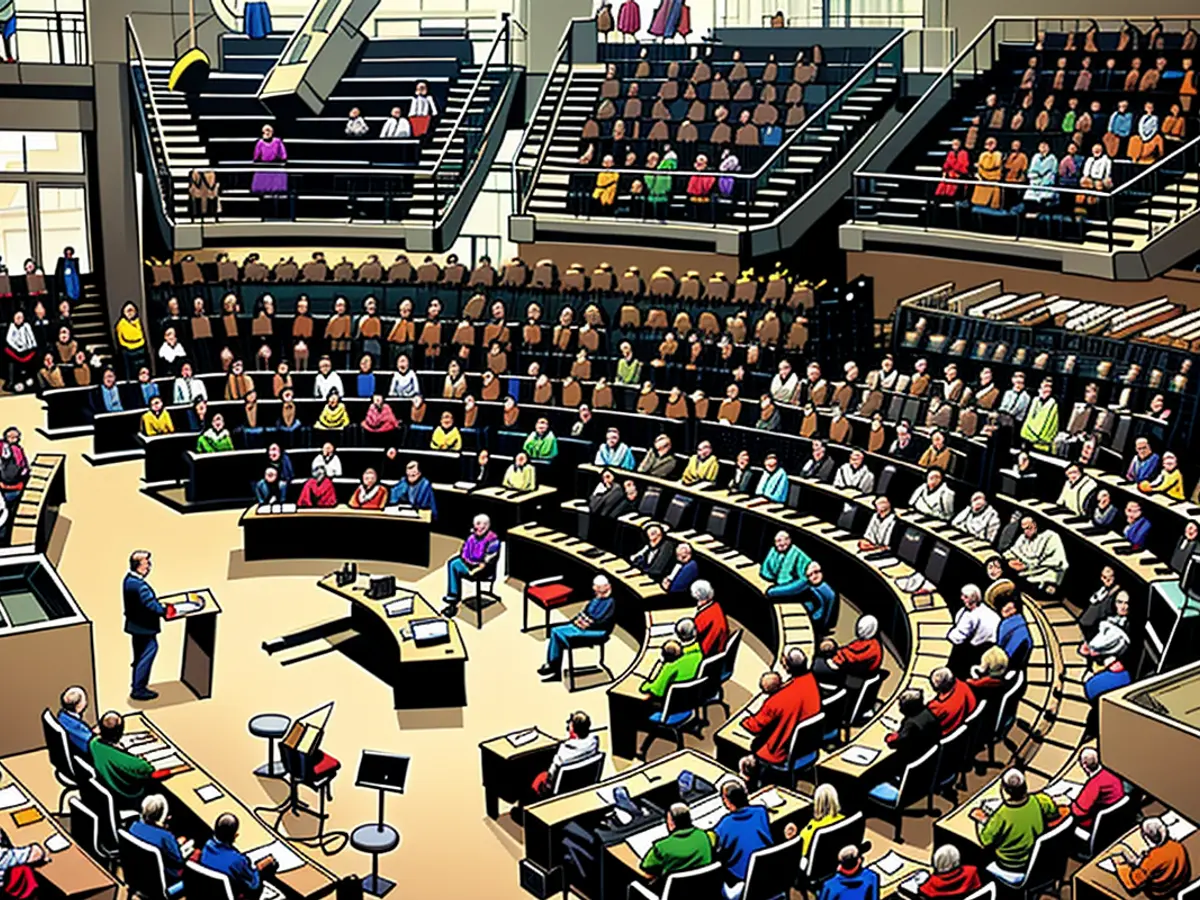Understanding the Significance of Flexibility and Concessions
At the start of the parliamentary week, Germany's Bundestag celebrates its 75th anniversary since its first session. Bundestag President Baβ stresses the importance of political debates and public involvement. During a historian's speech, the AfD struggles to maintain their composure.
Baβ commemorated the 75th anniversary of the parliament by advocating for defending democracy. "Many people no longer trust politics to solve their issues," she stated in the Bundestag's plenary hall in Berlin. "This gives those who exploit anger and fear, who belittle our country, and promote simple solutions, an advantage."
To the members of parliament and all citizens, Baβ made a "request on the 75th birthday of our parliament": "Let us use the power of compromise to generate good and sustainable solutions in the interest of the people!" Dissatisfaction with some political decisions should not lead to "letting ourselves be driven into irreconcilability," the Bundestag president stated. "Therefore, we are all called upon to remember the necessity of compromise more frequently."
Addressing the everyday problems faced by the people
Despite all the challenges, it is essential not to overlook the Bundestag's ability to overcome crises over the past 75 years. "I am convinced: Our democracy is robust and resilient against all those who want to harm it," Baβ continued. "A large majority of Germans consider democracy to be the best form of government. This was also demonstrated by the encouraging demonstrations at the start of the year."
At this point, Baβ's speech was interrupted by applause from all factions except the AfD. The demonstrations in various German cities at the beginning of the year were inspired by conversations within the AfD about "remigration," which refers to the expulsion of individuals with foreign roots. The AfD leadership denies having such plans.
Baβ acknowledged that many people are disillusioned with how democracy functions. "We as politicians are challenged to address the doubts about democracy by addressing the concrete everyday problems of the people," she said - and added: "without raising expectations that we cannot fulfill, without quick fixes, without the illusion that we only need to explain our actions better."
Encourage political engagement
"To bridge the gap between people and their representatives, we must also make political engagement more enjoyable and discover new forms of participation," the Bundestag president said. "We should leverage this civic engagement as a powerful source of strength for our democracy."
Baβ recalled that opponents of democracy also had a presence in the first elected Bundestag in 1949 - "from the far-right and far-left." The "greatest achievement" of these first Bundestag members was to demonstrate the effectiveness of parliamentary democracy - "because the enemies of the constitution were expelled from parliament."
Former Federal Interior Minister Gerhart Baum, in his speech, recalled the skepticism of foreign observers. They doubted whether the Germans could manage democracy. "Yes, they proved it. They can manage democracy," Baum emphasized. "Now they must prove that they can actively defend democracy."
Historian Christina Morina warned in her speech about anti-democratic currents. The logic of populist and extremist anti-parliamentary sentiment has gained greater traction through social media than its electoral support suggests. This logic is followed by "those who declare migration to be the mother of all problems, who elevate proximity to the people as the measuring stick of all politics, who attempt to justify demands by referring to 'the people'," Morina said. Her speech was repeatedly interrupted by heckling from the AfD faction, causing her to pause briefly.
The event was attended by Federal President Frank-Walter Steinmeier, Chancellor Olaf Scholz, and several other government representatives. The first German Bundestag was constituted on September 7, 1949, in the then-capital of Bonn. Eight years after reunification, the Bundestag moved into the Berlin Reichstag building in 1999, where it has been seated ever since.
Baébens request for political engagement also emphasized the importance of addressing the everyday problems of the people. She urged politicians to tackle these issues without raising unrealistic expectations or promising quick fixes.
The SPD, being one of the political parties in the Bundestag, plays a crucial role in ensuring that the people's concerns are heard and addressed in a democratic manner.








